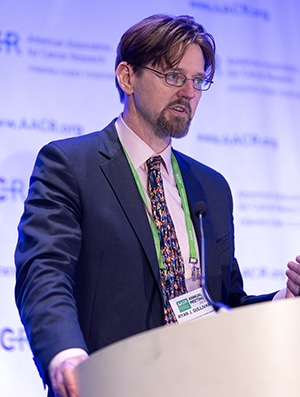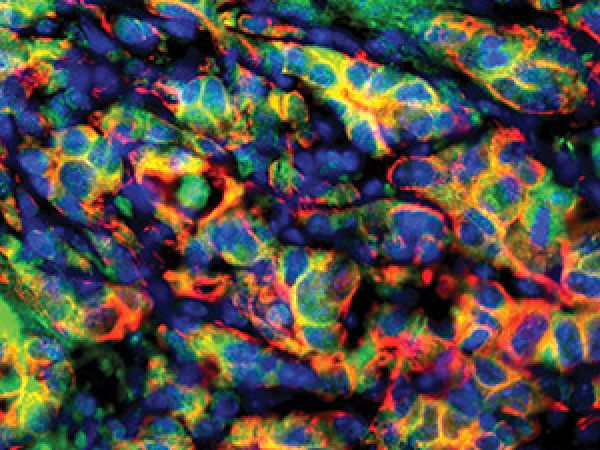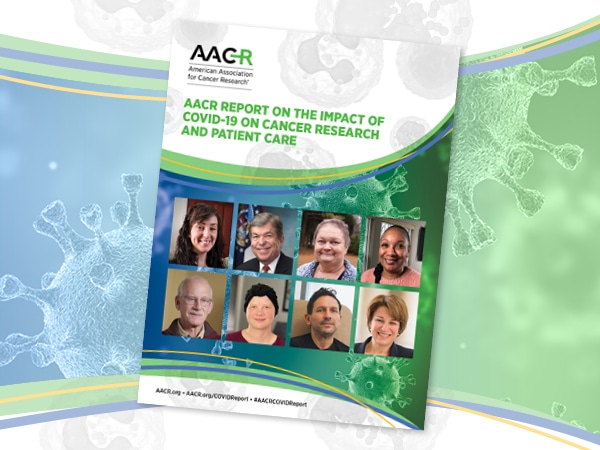AACR Annual Meeting 2023: Clinical Trials of Therapeutic Cancer Vaccines Show Promise
The concept of using vaccination to eradicate cancer by instructing the immune system to eliminate malignant cells has been pursued for decades with little success. Stimulating an immune response against cancer is more complicated than immunizing the body against an infectious agent: To be successful, cancer vaccine approaches must overcome significant hurdles, including low immunogenicity and the immunosuppressive effects of the tumor microenvironment.
So far, only a few therapeutic vaccine products have received approval by the U.S. Food and Drug Administration. These include sipuleucel-T (Provenge), a cell-based vaccine approved as a therapy for advanced prostate cancer; talimogene laherparepvec (T-VEC or Imlygic), an oncolytic virus vaccine approved for the treatment of metastatic melanoma; and Bacillus Calmette-Guérin, a live attenuated bacterial strain used to prevent early-stage bladder cancer from coming back after surgery.
Other vaccines have shown promise in preclinical studies but had very limited success in demonstrating clinical benefit.
Recently, some vaccine approaches have made headway, leading to optimism that effective therapeutic cancer vaccines may now be within reach. What has changed, and how are newer cancer vaccines getting closer to making a difference for patients?
Data discussed at the AACR Annual Meeting 2023 may help answer these questions.
Selecting More Effective Vaccine Targets
“Past vaccine strategies over the last 25 years attempted to induce immune responses against so-called tumor-associated antigens, which are not absolutely specific to the tumor as opposed to any normal tissue,” said Jeffrey Weber, MD, PhD, deputy director of the NYU Langone Perlmutter Cancer Center and Laura and Isaac Perlmutter Professor of Oncology at NYU Grossman School of Medicine.

Tumor-associated antigens are proteins expressed by malignant cells but also found at lower levels in normal tissues. Vaccination strategies that target such antigens showed limited efficacy in late-phase clinical trials.
The realization that individual tumor mutations can give rise to neoantigens, or proteins that are exclusively present in tumor cells, led investigators to explore them as ideal targets for immunotherapy, said Weber. “I think it is reasonable to state that neoantigen strategies are the most promising vaccine strategies in oncology today.”
While tumor-associated antigens are shared across a patient population, each patient’s tumor expresses a unique set of neoantigens that can flag the cancer as foreign to the immune system. Therefore, neoantigen-based vaccines are personalized based on the specific genetic makeup of a patient’s tumor.
messenger RNA Vaccines Come to the Fore
Another important aspect of cancer vaccines is the platform used to deliver the target antigens. Before the COVID-19 pandemic put mRNA vaccines in the spotlight, they were being studied as a platform for vaccination against other infectious diseases and as a therapeutic strategy for cancer.
mRNA-based vaccines provide some advantages over other platforms, including versatility and speed of manufacturing. In addition, since the immune system naturally detects and reacts to exogenous mRNA molecules, mRNA vaccines possess intrinsic adjuvant properties that amplify the immune response, explained Ryan Sullivan, MD, associate director of the Melanoma Program at Mass General Cancer Center and associate professor at Harvard Medical School.

Weber and Sullivan presented results from the first randomized phase II clinical trial of a personalized mRNA cancer vaccine to show evidence of clinical benefit.
The mRNA-4157/V940 vaccine given in combination with the immune checkpoint inhibitor pembrolizumab (Keytruda) improved recurrence-free survival in patients with resected, high-risk melanoma compared to pembrolizumab alone, which is the standard-of-care adjuvant therapy in this patient population. Patients who received both mRNA-4157/V940 and pembrolizumab had their risk of recurrence or death reduced by 44% compared to those who only received pembrolizumab.
Weber noted that the adjuvant setting is ideal for this strategy because the tumor tissue resected during surgery can be analyzed to identify the most promising neoantigens, manufacture the vaccine, and administer it to the patient while they are receiving the standard-of-care therapy for their cancer.
A biomarker analysis on data collected from patients at baseline focused on tumor mutational burden (TMB), tumor inflammation score, and PD-L1 expression, which are predicted to be associated with better outcomes. The study demonstrated that the benefit resulting from the combination of vaccine and pembrolizumab was independent of these biomarkers.
According to Weber and Sullivan, these findings are very encouraging and suggest that the neoantigen-based mRNA vaccine strategy might work in other tumors as well. The number of neoantigens varies widely across tumor types, Weber explained, but it may be possible to elicit antitumor immunity through an mRNA vaccine even in patients whose cancers express fewer neoantigens by using algorithms that predict which neoantigens are highly likely to be immunogenic.
“This study is extraordinarily important, because it gives hope that this novel strategy will provide clinical benefit,” said Weber.
Further data presented at the 2023 American Society of Clinical Oncology Annual Meeting demonstrated that the vaccine-pembrolizumab combination reduced the risk of distant metastasis or death by 65% compared with pembrolizumab alone.
A phase III trial to confirm phase II results in more patients and with a longer follow-up is expected to begin by the summer of 2023.
Targeting Pancreatic Cancer
More encouraging results came from a recently published study of another personalized mRNA-based vaccine tested in patients with pancreatic cancer.
Pancreatic ductal adenocarcinoma (PDAC) represents a model of immunologically “cold” tumor with few mutation-derived neoantigens, few T cells, and no response to immune checkpoint therapy, explained senior author Vinod Balachandran, MD, assistant attending surgeon at Memorial Sloan Kettering Cancer Center, during a session on cancer vaccines.

However, approximately 9% of PDACs are “hot,” infiltrated with activated, neoantigen-specific T cells and other immune cells, characteristics found in patients who experience exceptional long-term survival, he added.
Balachandran and his team studied the neoantigens in long-term PDAC survivors to understand why their tumors are hot and how this can be replicated to design therapeutic interventions. As explained in a previous post, they found that certain neoantigen qualities predicted survival better than quantity, and that T cells targeting those high-quality neoantigens persist long-term in PDAC survivors. These observations led to the development of a neoantigen quality model and suggested that such high-quality neoantigens would constitute ideal targets for a vaccination strategy because they give rise to long-term immunologic memory, Balachandran said.
In a small clinical trial, Balachandran and colleagues leveraged an mRNA vaccine platform to rapidly produce a customized vaccine, autogene cevumeran, targeting neoantigens derived from surgically resected PDAC tumors. They tested if this vaccine could stimulate neoantigen-specific T cells and delay recurrence.
After surgery, patients received one dose of the immune checkpoint inhibitor atezolizumab (Tecentriq) followed by up to eight priming doses of the vaccine, then by the standard-of-care chemotherapy regimen for resectable PDAC, and eventually by a vaccine boost. “Rapid custom vaccination is feasible, fully integrated into a standard oncologic workflow, even after complex cancer surgery, as is required for PDAC,” said Balachandran.
Autogene cevumeran induced de novo neoantigen-specific T cells in eight out of 16 patients. These responses were robust, with vaccine-induced T cells representing up to 10% of the T cells in the blood, and durable, being still present after two years from vaccination. Furthermore, at 18 months follow-up time, there was a correlation between vaccine response and delay in recurrence.
The researchers determined that the patients who did not experience a response were not less immunologically fit than those who did, as both responders and non-responders mounted good humoral and cellular responses to an mRNA vaccine against SARS-CoV-2 that was administered concurrently, Balachandran pointed out. Further studies showed that the quality of neoantigens correlated with vaccine response.
mRNA neoantigen vaccines may afford a therapeutic effect in patients with pancreatic cancer, a cancer historically thought to not contain mutation-derived neoantigens suited for vaccines, Balachandran said. These findings provided the basis for a randomized phase II clinical trial that is imminent in 2023, he added.
Peptide-based Vaccines
Another platform explored for neoantigen-targeted vaccination is based on peptides, which have a history of safety for use in patients, having been tested in several clinical trials, said Catherine J. Wu, MD, FAACR, professor of medicine at Harvard Medical School and the Lavine Family Chair for Preventative Cancer Therapies at Dana-Farber Cancer Institute.

In a 2017 study by Wu and colleagues, a personalized vaccine with synthetic long peptides assessed as adjuvant therapy in high-risk melanoma patients demonstrated the feasibility, safety, and immunogenicity of this approach. Among a group of six patients who received the vaccine, called NeoVax, four had no recurrence for up to 25 months. The two patients who had recurrent disease were then treated with immune checkpoint inhibitor therapy and experienced complete clinical response within 12 weeks, Wu said.
A longer follow-up of the patients on the study, conducted nearly four years after vaccination, showed that neoantigen-specific T cells were still circulating in their blood, in addition to T cells reactive against epitopes that were not present in the vaccine. This finding was suggestive of epitope spreading, or the occurrence of further T-cell responses against intracellular peptides released as a consequence of vaccine-induced tumor cell killing, Wu explained.
“All of these are very encouraging results. We have had a lot of ups and downs in the field of cancer vaccination, but right now the winds are blowing in a very positive direction,” Wu said. She emphasized that the pandemic provided valuable lessons on how to approach the issues of time and cost and how to get vaccines to scale.



